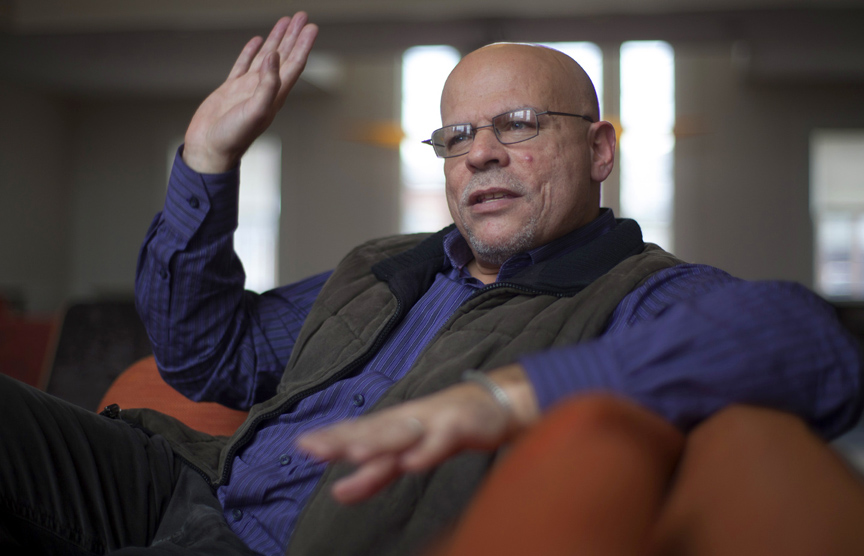
Describe your poetry. What is your style? What are your influences?
I have a wide range of influences. I tend to learn everything through the ear. My early influences were always oral and musical, starting with poetry I probably didn’t really understand by Eliot that my mom was reading me. So she would say things like, “So intimate, this Chopin, that I think his soul should be resurrected only among friends some two or three, who will not touch the bloom that is rubbed and questioned in the concert room.” There’s not a lot of that that I would have understood when she said it, but I did hear it and I really loved the sound of it. And Langston Hughes is a poet I became acquainted with really early on and again it was the sound and the rhythm and the music in the poetry that I responded to first. In terms of poets that I read now: Lucille Clifton, Adrienne Rich, Ruth Stone, Robert Hass, Kevin Young.
What is your writing process like?
I have a daily practice. There’s nothing precious about it. I don’t wait for subjects and content. Whatever is in my head and whatever happens to be happening that day, it all makes it in. I don’t filter out a lot, I revise a lot. Ordinary life is a good enough subject for poetry and I say all the time to the elders I work with at the assisted living center, and the high school students too, that poets don’t just pull things out of thin air. The air’s thick with ideas and the way people talk; just pay attention and listen. So that’s my process, fast and loose and long and simmering, because I do not want anything to get in the way of my thinking. If you want to be able to think, you’ve got to suspend your judgment, and that means not worrying too much if it’s any good or not, but also not thinking it’s too good. Either way, you can ruin the poem by letting yourself think too much. I believe in simmering and I believe it takes a while for certain relationships to announce themselves in your head, but that once they have, the poem may come out fairly quickly.
How did you first make the connection between poetry and community service?
So I have always done community work. As a graduate student at Rutgers, I was directing an HIV/AIDS project and I was also doing a lot of work with the New Jersey poets-in-the-schools program. Those things seemed kind of split and compartmentalized and over time it became really important for me not to distinguish between them so much and also not to choose between things that I loved. And so I think my earliest experiments were teaching AIDS and literature courses at Rutgers, and then from the time I first began to teach at Brown, every class I taught has had a community component. I also do nonprofit work and at times while teaching here I’ve also been the full-time executive director of a nonprofit. My life has always had this balance of community practice and creative practice and intellectual practice and spiritual practice and family. I don’t like choosing between things that I love, so I’ve found ways to integrate them so it feels to me like a pretty seamless life.
How do you believe poetry can be used to foster and serve the community?
There’s a poem by Lucille Clifton that’s called “Whose Side Are You On?” One of the things to pull out from that poem is that it’s not just about helping the people you love. As a Tibetan scholar once said, “It’s never neglecting the simplest kind deed. Just do it.” And the Clifton poem asks you to be entirely inclusive in your service work. It’s easy to serve the people we love. It’s actually harder to serve people we don’t. The lesson in the poem is pretty profound and I’m always looking for poems to release their instructions, and so poetry has always been of value to me in my community work. You can say a poem, unlike having to read a whole book, or having to listen to a lecture. As Clifton used to say when she was alive, “I can do it in 12 lines. I can give you a history lesson in 20 lines.” And that’s true actually. Poetry plumbs a deep line into something in a compressed and distilled way, and that’s lovely.
What do you hope to accomplish in your new position as State Poet?
When I first moved to Rhode Island, one of the things that surprised me was that there was no statewide poets-in-the-schools program. So that’s one thing I’d like to see happen. Seeing that need is what prompted me to teach community-oriented courses here at Brown, to compensate, in some small way, for that need. I take seriously that enthusiastic, passionate college students who are interested in poetry and community practice can do a lot of good in lot of different places by doing poetry workshops at local schools. And what I’m doing here at Brown seeds the possiblity for practicing this more widely. I’d also really like to find some funding for teachers in this state. Teachers of literature and poetry are passionate and love what they teach but they don’t always have the opportunity to expand their own learning. I’d like to fund something for teachers where they could focus on their own work and publish. I see this position as an opportunity to circulate poetry more widely. I really believe in the value of poetry to do the work of helping people build their lives and build relationships and be more fully in community with each other. That’s an idea of poetry that dates back to time immemorial.
